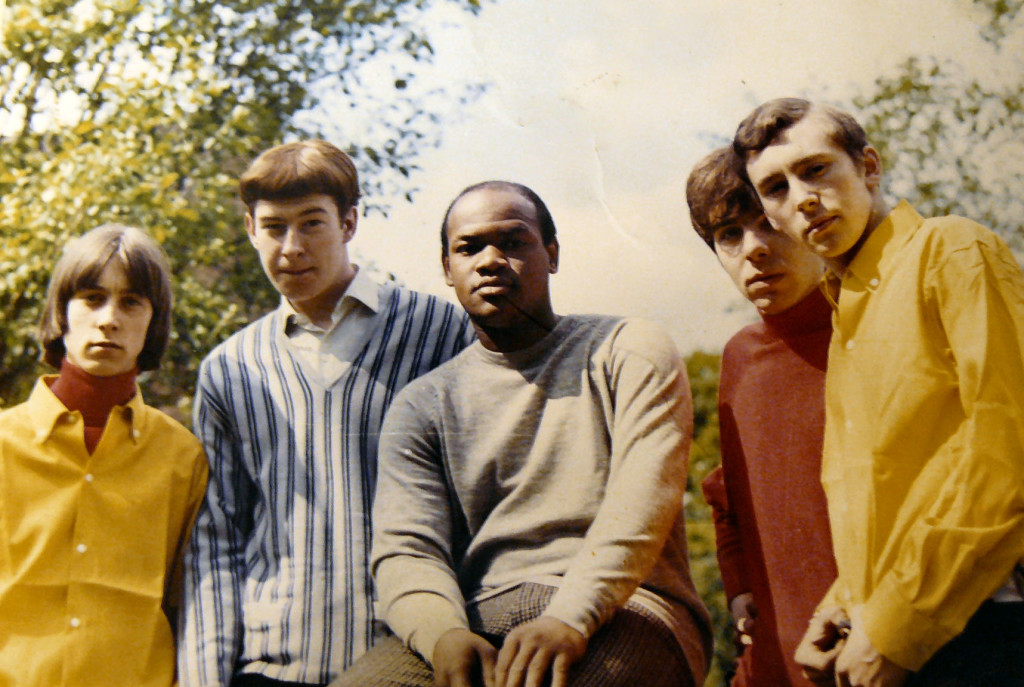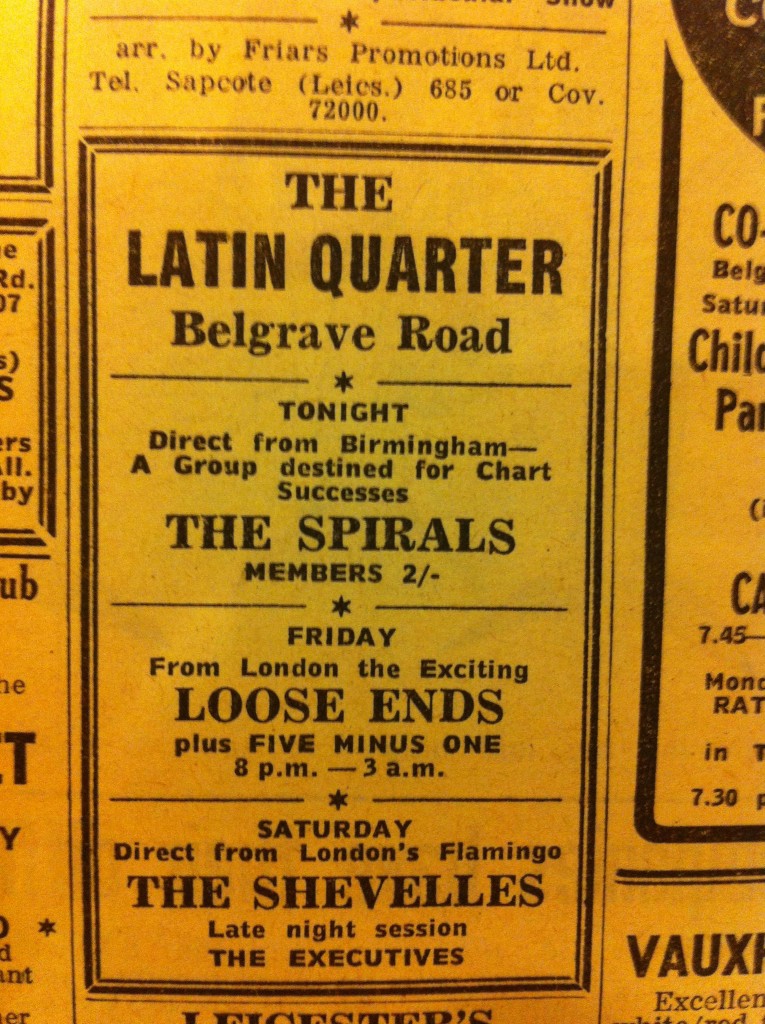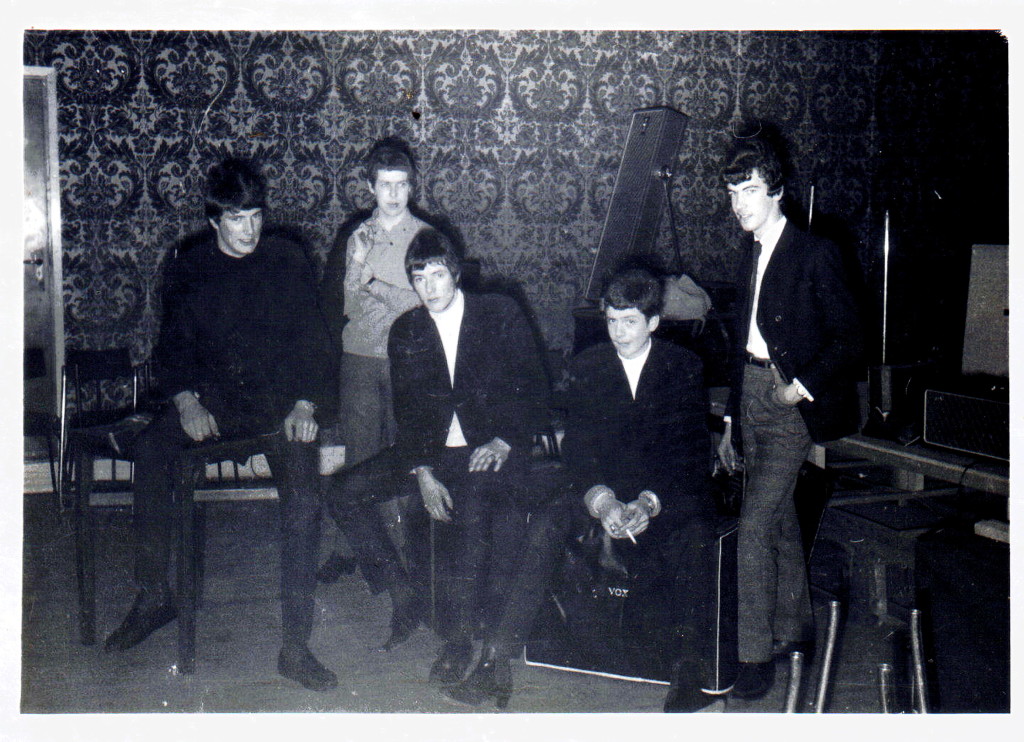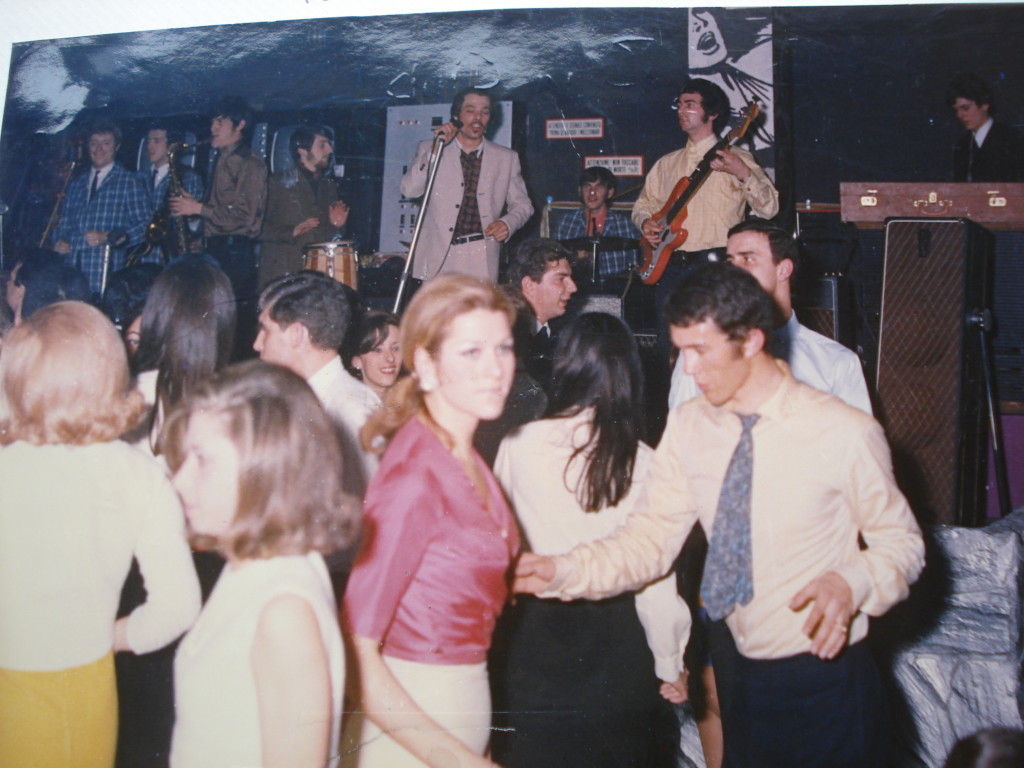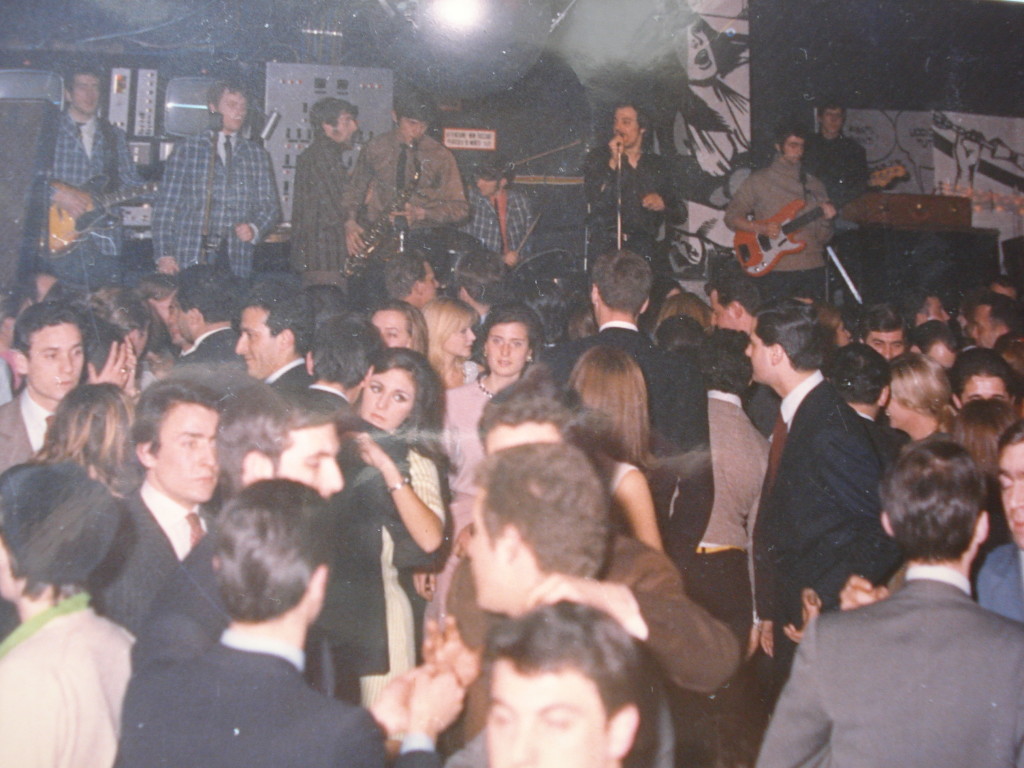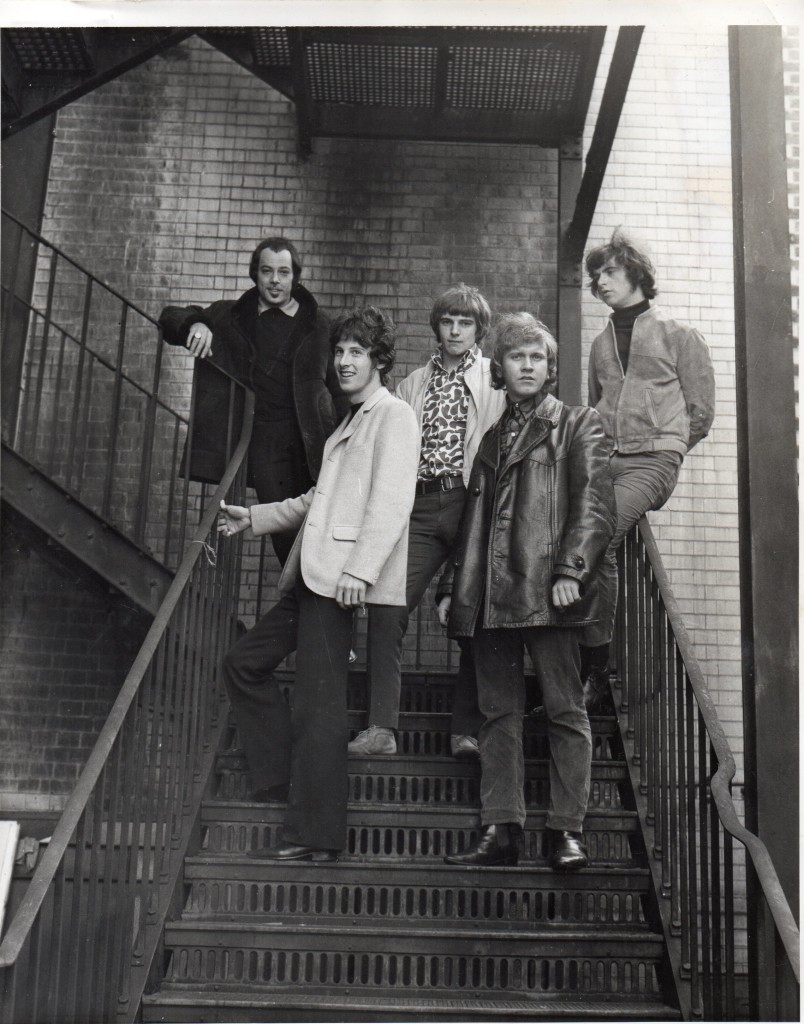By Nick Warburton
- Alan Marshall – lead vocals
- Ron Bryer – lead guitar
- Rick Marshall – bass
- Roy Davies – keyboards
- Alan Whitehead – drums
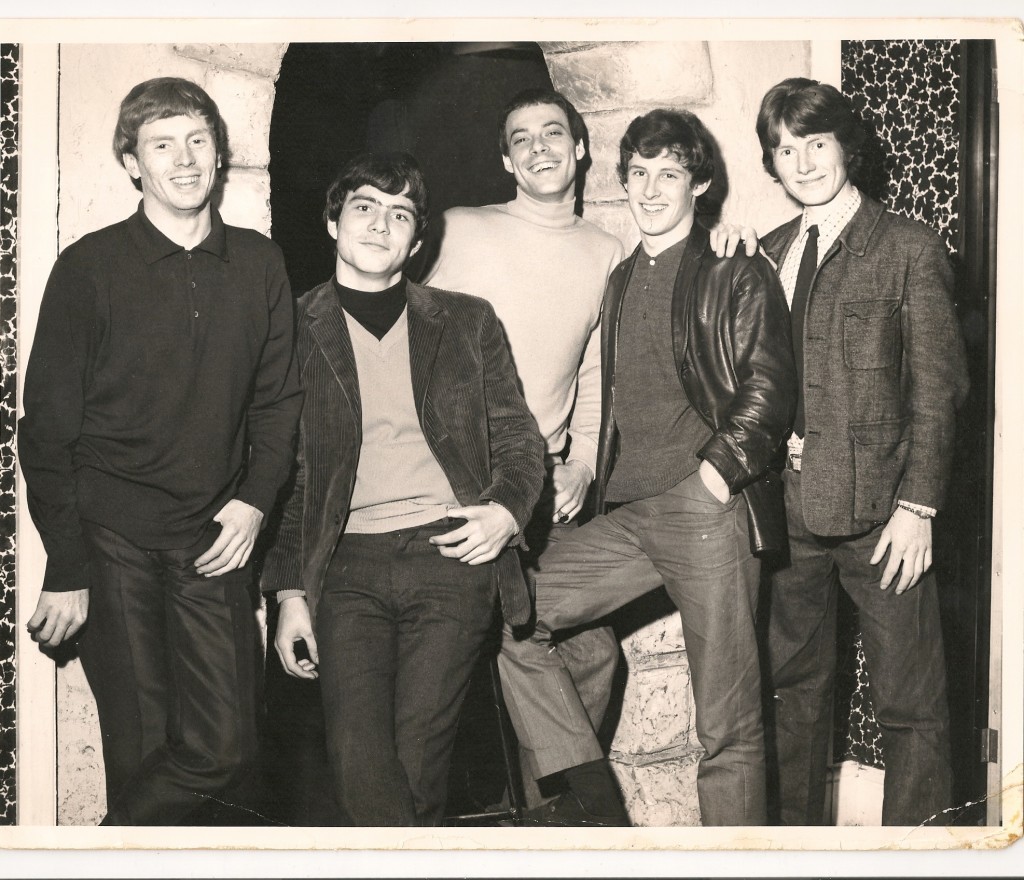
The Loose Ends, 1966, left to right: Roy Davies, Rick Marshall, Alan Marshall, Peter Kirtley and Alan Whitehead (photo from Alan Whitehead)
Formed in Bexley Heath, Kent in late 1963, The Loose Ends were fronted by Lahore-born singer Alan Marshall and his bass playing cousin Rick Marshall.
Lead guitarist Ron Bryer was also there from the outset alongside drummer Peter Hetherington and a rhythm guitarist called Jeremy, who soon made way for keyboard player Roy Davies.
After rehearsing in a scout hut in Bexley Heath and playing some local gigs, Orpington-based drummer Alan “Noddy” Whitehead took over the drum stool after working with singer Crispian St. Peters.
The new formation started landing regular gigs at notable local venues like the Bromel Club in Bromley, the Tiger’s Head in Catford and the Glenlyn Ballroom in Forest Hill. Crucially, their manager Bryan Mason secured the group a residency at Lewisham’s El Partido, a club that he owned, which helped build their local fan base.
However, around June/July 1965, Ron Bryer departed to join The Carl Douglas Set and remained with the Jamaican singer for a year before hooking up with Bexley, Kent R&B outfit, The Big Wheel, which featured future Clark-Hutchinson member, Andy Clark. The group toured extensively in Switzerland and recorded a rare Swiss-only single in late 1966 for the Eurex label.
Ron Bryer with Carl Douglas Set (second right) (photo from Ken Baxter)
When The Big Wheel split, Ron Bryer joined Dee Dee Barry & The Movements in July 1967 and appeared on a string of singles. During 1968, however, he formed Brainticket, who recorded the Krautrock classic Cottonwoodhill album in 1971. Tragically, he died from a drug overdose in 1973.
https://www.youtube.com/watch?v=l3nepy_SkwM
Selected gigs:
26 September 1964 – Glenlyn Club, Forest Hill (start playing Monday nights)
16 November 1964 – 100 Club, Oxford Street, London with The Birds
12 December 1963 – Studio 51, Leicester Square, London with The Impacts
19 December 1964 – Cromer Links Pavilion, Cromer, Norfolk with Maniax
16 January 1965 – Studio 51, Leicester Square, London with The Impacts
25 January 1965 – Bromel Club, Bromley Court Hotel, Bromley, Kent
29 January 1965 – Rainbow Club, Acre Hall, Northwood, Middlesex
2 February 1965 – 100 Club, Oxford Street, London with The Pretty Things
13 February 1965 – Cromer Links Pavilion, Cromer, Norfolk with The Trends
18 February 1965 – 100 Club, Oxford Street, London with The Graham Bond Organisation
25 February 1965 – Bromel Club, Bromley Court Hotel, Bromley, Kent
10 April 1965 – Ricky Tick Club, Basingstoke, Hants
15 April 1965 – 100 Club, Oxford Street, London with Graham Bond Organisation
29 April 1965 – 100 Club, Oxford Street, London with Graham Bond Organisation
16 May 1965 – Bromel Club, Bromley Court Hotel, Bromley, Kent
16 May 1965 – Studio ’61, Leicester Square, London
23 May 1965 – Studio ’61, Leicester Square, London
27 May 1965 – Cook’s Ferry Inn, Edmonton
6 June 1965 – Studio 51, Leicester Square, London
Guitarist Peter Kirtley from Jarrow took Ron Bryer’s place. A former member of The Chevrolets and Shorty & Them, Kirtley had appeared on the latter’s lone single, “Pills or Love’s Labour Lost” c/w “Live Laugh Love”, released on Fontana in 1964, and a German-only album, shared with Liverpool group, The Roadrunners, before decamping to London in early 1965.
According to the South East London Mercury newspaper’s 19 February 1965 edition, Kirtley and fellow Jarrow musician, bass player, the late Brian Rowan formed the short-lived Take Six with southeast London musicians, organist Roger Read (ex-Wranglers/Showtimers) and drummer Graham Willard in early 1965.
In February 1966, The Loose Ends landed a semi-residency at swinging Mayfair club, the Scotch of St James.
Having inked a deal with Decca Records in late 1965, The Loose Ends cut their debut single, an impressive take on “Send The People Away”, a rare Moody Blues’ track, backed by a cover of “I Ain’t Gonna Eat Out My Heart Anymore”, which was shipped in July 1966.
That same month, South East London Mercury reported that bass player Dave Collman had taken over from Rick Marshall.
Selected gigs:
13 June 1965 – Studio 51, Leicester Square, London
20 June 1965 – Studio 51, Leicester Square, London
27 June 1965 – Studio 51, Leicester Square, London
4 July 1965 – Studio 51, Leicester Square, London
25 July 1965 – Tavern Club, Dereham, Norfolk with The Mode
14 August 1965 – Ricky Tick Club, Basingstoke, Hants
10-11 September 1965 – El Partido, Lewisham with Duke Lee
11 September 1965 – El Partido, Lewisham with Duke Lee, Sonny Childe and Lou Johnson
18 September 1965 – El Partido, Lewisham with The Artwoods
25 September 1965 – El Partido, Lewisham with Guy Darrell
2 October 1965 – El Partido, Lewisham with Jesse Fuller, The Spectres and Duke Lee
9 October 1965 – El Partido, Lewisham with Dave Antony’s Moods, Duke Lee and Next of Kin
16 October 1965 – 100 Club, Oxford Street, London
20 October 1965 – El Partido, Lewisham with Long, Short & Tall and Duke Lee
23 October 1965 – El Partido, Lewisham with The Minor Birds and Duke Lee
30 October 1965 – El Partido, Lewisham with Hamilton & The Movement and Duke Lee
3 November 1965 – El Partido, Lewisham with Blues Roots and Duke Lee
20 November 1965 – El Partido, Lewisham with Guy Darrell, Winds of Change and Duke Lee
27 November 1965 – El Partido, Lewisham with The Panics and Duke Lee
16 December 1965 – Cook’s Ferry Inn, Edmonton
18 December 1965 – El Partido, Lewisham with Frank Sheen Sound and Duke Lee
24 December 1965 – El Partido, Lewisham with Duke Lee and Frank Sheen Sound
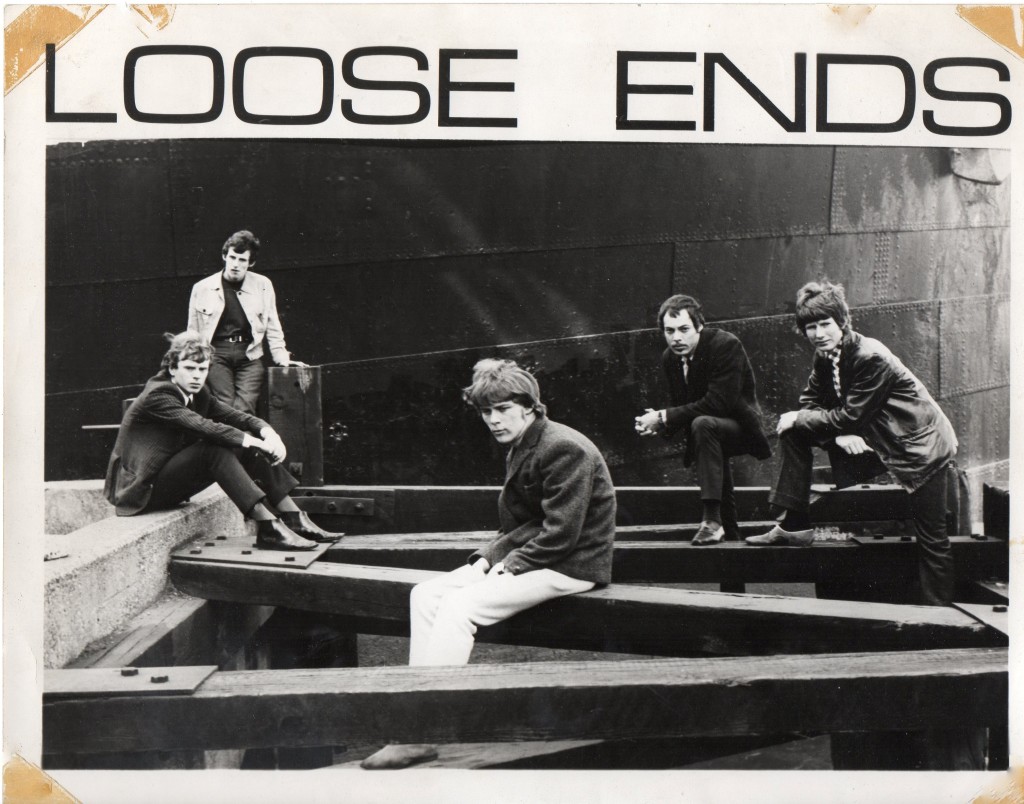
The Loose Ends, left to right: Roy Davies, Peter Kirtley, Dave Collman, Alan Marshall, Alan Whitehead (photo from Peter Kirtley)
16 January 1966 – Tower Ballroom, Great Yarmouth with Ketas
February-April 1966 – Scotch of St James (three times a week)
26 February 1966 – Glenyn Ballroom, Forest Hill, London
17 March 1966 – Pontiac, Putney, Surrey
29 March 1966 – Marquee, London with The Action
2 April 1966 – St Peter’s Hall, Croydon, Surrey with The Board Walkers
26 May 1966 – Marquee, London with The Bo Street Runners
28 May 1966 – Glenlyn Ballroom, Forest Hill
4 June 1966 – Southeast Jazz Blues Festival, Blackheath with Manfred Mann, Georgie Fame & The Blue Flames, Roy C and Zoot Money’s Big Roll Band
5 June 1966 – Regency Ballroom, Bath with Tiffany’s Thoughts
6 June 1966 – Flamingo, Soho with Ray Brown’s Sounds
13 June 1966 – Flamingo, Soho with Ray Brown’s Sounds
17 June 1966 – Latin Quarter, Leicester with Five Minus One
20 June 1966 – Flamingo, Soho with Ray Brown’s Sounds
27 June 1966 – Flamingo, Soho with Ray Brown’s Sounds
According to an article in the Wandsworth Advertiser on 29 July, the band held down a Wednesday residency at the Bromel Club in Bromley during July and besides playing at the Scotch of St James and Flamingo, The Loose Ends also performed at the Marquee. Apparently, they also opened a game at Charlton Athletic FC.
Barely a month after the band’s debut release, Decca issued a second single on 5 August 1966, once again produced by Noel Walker. Coupling a superb freakbeat version of George Harrison’s “Taxman” with the more R&B flavoured “That’s It”, the second outing should have been a hit but for some reason failed to chart.
However, despite the clutch of great singles, The Loose Ends were unravelling quickly.
In late September, Alan Whitehead departed, initially to join Cops ‘N’ Robbers. He then spent a month or so playing with The Epitaph Soul Band before joining The Attack alongside singer Richard Shirman and guitarist David O’List, and cut enough material in the run up to Christmas for a debut single.
Issued on 27 January 1967, the drummer can be heard on The Attack’s debut single, a great cover of The Standells’ “Try It” c/w the band original, “We Don’t Know”. By the time the single had reached the shops, he had decamped to join The Marmalade and remained with the band throughout its most successful years. In an interesting side note, he also auditioned for the band that became Procol Harum.
Selected gigs:
6 July 1966 – Bromel Club, Bromley, Kent with The Squires
8 July 1966 – Tiles, London with Rufus Thomas
13 July 1966 – Bromel Club, Bromley, Kent with The Good Things
16 July 1966 – Savoy, Catford, London
17 July 1966 – Eltham Baths, Eltham, Kent
18 July 1966 – Flamingo, Soho with Ray Brown’s Sounds
26 July 1966 – Scotch of St James, Mayfair
27 July 1966 – Bromel Club, Bromley Court Hotel, Bromley, Kent
29 July 1966 – Glenyn Ballroom, Forest Hill, London
9 September 1966 – Marquee, London with Gary Farr & The T-Bones
15 September 1966 – Ram Jam, Brixton, London
17 September 1966 – Witchdoctor, Catford, London (last gig with Alan Whitehead)
Alan Whitehead’s departure appears to have prompted a wider split. In October 1966, Peter Kirtley accepted an offer to join The Alan Price Set, working alongside bass player Boots Slade; trumpeter John Walters; sax players Steve Gregory and Clive Burrows (replaced by Terry Childs); and drummer Roy Mills.
With two of the band’s integral members gone, the band appears to have split into two versions with singer Alan Marshall joining forces with Croydon, Surrey band, The Subjects, which features Malcolm Rudkin (vocals); Alan Griffin (lead guitar); Phil Lanzon (organ); John Manderson (bass); and Roy Manderson (drums).
The Subjects at Bromley Court Hotel, from left to right: John Manderson (on bass), Malcolm Rudkin (vocals), Roy Manderson(drums), Phil Lanzon (Organ), Alan Griffin (lead) (photo from Alan Griffin)
After a few months, John Manderson and Malcolm Rudkin, who did not want to turn professional, departed and the band’s manager Bryan Mason recruited sax player/guitarist Mick Patel, who may be the same musician that had previously worked with Carl Douglas and bass player Colin Pullen from Kent band, Bob ‘N’ All. Not long after, Roy Manderson was succeeded by another Bob ‘N’ All member, Tony Glyde.
Selected gigs:
23 October 1966- Bromel Club, Bromley Court Hotel, Bromley, Kent
28 October 1966 – Tiger’s Head, Catford, London
3 November 1966 – Raven’s Club, Lewisham
12 November 1966 – Matlock Ball Pavilion, Matlock, Derbyshire with Family
20 November 1966 – Bromel Club, Bromley Court Hotel, Bromley, Kent
Roy Davies and Dave Collman meanwhile worked as The New Loose Ends for a few months.
Selected gigs:
26 December 1966 – Bromel Club, Bromley Court Hotel, Bromley, Kent (billed as New Loose Ends)
15 January 1967 – Bromel Club, Bromley Court Hotel, Bromley, Kent (billed as New Loose Ends)
The Loose Ends, Milan, 1967 (photo from Colin Pullen)
In early December 1966, Bryan Mason expanded the Alan Marshall formation by adding another Bob ‘N’ All member – singer Bob Saker and the group landed a residency at the Playboy Club. While there, The Loose Ends entertained the entire England World Cup winning team and their wags.
After rehearsing at the El Partido in Lewisham, and playing a lone gig at the Star Hotel in Croydon in early January 1967, The Loose Ends landed a residency at the Bang Bang Club in Milan’s San Guiliano district, which kicked off in the third week of January. Alan Griffin departed just before the group left and Colin King from Bob ‘N’ All took his place.
The Loose Ends, Milan, 1967 (photo from Colin Pullen)
While playing at the Bang Bang in Milan, the musicians met Georgio Moroder and Brian Auger and Julie Driscoll at the club.
In early March 1967, The Loose Ends returned to London and played at the Scotch of St James and the Speakeasy. While loading out the band’s gear from the Speakeasy one night, Jimi Hendrix and a couple of friends came out and the famous guitarist told Lanzon: “Nice combo man”.
At one of the venues, Otis Redding spotted the band and, impressed by Alan Marshall and Bob Saker’s vocals, took the two singers to Muscle Shoals in the US to record two tracks during May-June 1967.
The pair cut covers of “Johnny B Goode” and “Keep on Pushing” with Redding producing at Fame Studios. However, soon after there was a split between Jerry Wexler and Phil Walden and the proposed single was held back. The two singers then returned to London.
Selected gigs:
January-March 1967 – Bang Bang, Milan, Italy (six weeks and billed as Gli Erranti)
The Loose Ends, Milan, 1967, from left to right: Tony Glyde (drums), Colin King (guitar), Bob Saker (vocals), Mick Patel (sax) and Colin Pullen (bass). Alan Marshall and Phil Lanzon (not pictured) (photo from Colin Pullen)
8 March 1967 – Bromel Club, Downham, Kent (probably one of the first after Milan)
April 1967 – Scotch of St James and Speakeasy (Otis Redding sees them)
15 April 1967 – The Polytechnic, Central London with Savoy Brown Blues Band
With the singers both gone, Colin Pullen and Phil Lanzon stuck together and reunited with former members Alan Griffin and Roy Manderson in Cats Pyjamas who made two singles with CBS. The group held down a residency in Madrid in May 1968 and then gigged around London. Lanzon, Griffin and Manderson briefly played with Geno Washington in late 1969-early 1970.
Cats Pyjamas, at the back from left to right: Kenny Bernard, Roy Manderson, Phil Lanzon; at the front from left to right: Alan Griffin, Colin Pullen (photo from Colin Pullen)
Phil Lanzon later recorded with Grand Prix, toured and recorded with Sweet and has toured and recorded with Uriah Heap since the mid-1980s.
Tony Glyde meanwhile spent a brief period with The Fenmen before joining Simon K & The Meantimers in late 1967.
When the two recordings were shelved (after Redding’s untimely death), Bob Saker cut a lone single for Polydor and then a string of singles for Parlophone and CBS (as Saker) in 1968 and 1971. In 1972, he reverted to his full name and recorded a series of singles for the York label and an album They’ve Taken Back My Number, which features Maurice Gibb.
Alan Marshall meanwhile reunited with former guitarist Peter Kirtley in Happy Magazine, a soul/R&B outfit that was managed and produced by Alan Price.
Joined by Kirtley’s old friends from Jarrow, the late Kenny Craddock on organ from Tyneside bands The Elcorts and New Religion, and Brian Rowan on bass from Shorty & Them plus Alan White on drums (who was replaced later by West Londoner Malcolm Wolffe from The Tribe), the band cut material that was split over three singles for Polydor.
The Happy Magazine, original line-up, late 1967, from left to right, back – Alan Marshall, Alan White, Kenny Craddock; front Peter Kirtley, Brian Rowan (photo from Peter Kirtley)
Kicking off with Alan Price’s excellent “Satisfied Street”, backed with “Beautiful Land” in December 1967, featuring a horn section that may well be Amboy Dukes members Buddy Beadle and Steve Gregory (also ex-Alan Price Set), the label re-issued the track three months later coupled with the Dan Penn/Spooner Oldham soul classic “Do Right Woman – Do Right Man”.
However, it was possibly the band’s third and final outing, a brilliant reading of the Dee/Potter collaboration, “Who Belongs To You”, coupled with the previously available “Beautiful Land”, issued on 14 February 1969, that should have catapulted the band into the charts.
With the single failing to grace the charts, Alan Marshall departed to form the experimental jazz/funk/blues band, One, who cut a brilliant lone album for Fontana later that year (with Peter Kirtley reportedly playing the lead guitar).
Joined by lead guitarist Kevin Fogarty (originally a member of Southport R&B group, Timebox); keyboardist Bobby Sass (an early member of Happy Magazine); bass player Brent Forbes; sax and flutist Norman Leppard; and drummer Conrad Isidore, One should have been a huge success but the album sank without a trace.
Peter Kirtley and Kenny Craddock meanwhile brought in three friends from Jarrow – ex-Skip Bifferty members, singer Graham Bell and bass player Colin Gibson, and future Yes drummer Alan White, who’d been the original drummer in Happy Magazine, and signed to Bell Records for a one-off single as Griffin.
Produced by Alan Price and issued on 25 September 1969, the Kirtley-Gibson-Craddock collaboration, “I am The Noise in Your Head”, coupled with Kirtley’s “Don’t You Know” was an impressive outing but failed to trouble the charts.
Griffin soon splintered and Kirtley went on to record with several notable bands, including Riff Raff, Radiator and Pentangle. Later he appeared on albums by Liane Carroll and Bert Jansch.
Kirtley has also issued two solo albums, Peter Kirtley and Bush Telegraph as well as the charity single, “Little Children”, for Jubilee Action, to raise money for street children in Brazil and featuring Paul McCartney.
Alan Marshall, meanwhile, had surfaced as a solo artist on Fontana in 1970. In France, the label issued a rare single that coupled One’s excellent cover of Richie Havens’s “Don’t Listen To Me” with a solo outing – “How Much Do You Know”, adapted from “Adagio Royal” by F de Boivallee.
When that single failed to chart, Marshall ended up joining Strabismus, which subsequently changed its name to Riff Raff when the singer’s former band mate from The Loose Ends/Happy Magazine, Peter Kirtley joined. However, Marshall quit before Riff Raff’s debut album was recorded and pursued a solo career before recording with Zzebra. He then joined Gonzalez in the late Seventies in time for their 1979 release, Move It To The Music. Marshall continues to busk in Stratford, East London.
Interestingly, Gonzalez’s keyboard player was Roy Davies, Marshall’s former band mate from The Loose Ends. In the intervening years between the end of The New Loose Ends and joining Gonzalez in 1974, Davies had worked initially with The Freddy Mack Sound, then The Maximum Breed Band and later The Butts Band with members of The Doors. He later became a prolific session player before passing away in 1986.
The Loose Ends recordings meanwhile have surfaced on numerous Sixties CD compilations, including Deram’s Mod Scene and Freakbeat Scene.
I would like to thank Alan Griffin, Peter Kirtley, Phil Lanzon, Alan Marshall, Colin Pullen, Bob Saker and Alan Whitehead for helping with the story. Thanks also to Vernon Joynson and Bruce Welsh. Thank you Peter Kirtley, Alan Marshall, Bob Saker and Alan Whitehead for the use of photos.
The gigs have been sourced largely from Melody Maker plus local newspapers like the South East London Mercury, Eastern Evening News, Harrow Weekly Post, Bristol Evening Post among others.
